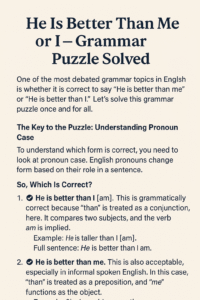“He is better than I”? He Is Better Than Me or I – Grammar Puzzles Solved (15)
One of the most debated grammar topics in English is whether it is correct to say “He is better than me” or “He is better than I.” At first glance, both may sound acceptable, especially in everyday speech. However, one of these forms follows traditional grammar rules more closely. Let’s solve this grammar puzzle once and for all.
The Key to the Puzzle: Understanding Pronoun Case
To understand which form is correct, you need to look at pronoun case. English pronouns change form based on their role in a sentence.
-
Subjective case (used for subjects): I, he, she, we, they
-
Objective case (used for objects): me, him, her, us, them
So, Which Is Correct?
Both “He is better than me” and “He is better than I” can be correct—but they are used in different contexts.
-
✅ He is better than I [am].
This is grammatically correct because “than” is treated as a conjunction here. It compares two subjects, and the verb am is implied.-
Example: He is taller than I [am].
-
Full sentence: He is better than I am.
-
-
✅ He is better than me.
This is also acceptable, especially in informal spoken English. In this case, “than” is treated as a preposition, and “me” functions as the object.-
Example: She loves him more than me. (This could mean “more than she loves me.”)
-
Which Should You Use?
Use “He is better than I” when you want to be grammatically formal and precise. Use “He is better than me” when speaking casually, especially in conversation. Both are understandable, but the first is more accepted in formal writing.
More Examples
-
Formal: She is stronger than I. (implied: than I am)
-
Informal: She is stronger than me.
-
Formal: They know more than I.
-
Informal: They know more than me.
Final Verdict
In formal writing, “He is better than I” is the preferred choice. “than me” is commonly used and widely accepted in everyday speech. So, the choice depends on your tone and audience.

Difference Between Connotative and Denotative Meanings with Examples:
https://grammarpuzzlesolved.englishlitnotes.com/connotative-and-denotative-meanings/
Nun’s Priest in The Canterbury Tales:
https://englishlitnotes.com/2025/06/07/nuns-priest-in-canterbury-tales/
Sir Alexander Fleming by Patrick Pringle:
https://englishwithnaeemullahbutt.com/2025/06/02/alexander-fleming/
Edward Taylor as a Poet: https://americanlit.englishlitnotes.com/edward-taylor-as-a-poet/
For grammar lessons, visit ChatGPT to explore the platform and interact with the AI: https://chat.openai.com
Discover more from Grammar Puzzle Solved by Naeem Ullah Butt
Subscribe to get the latest posts sent to your email.